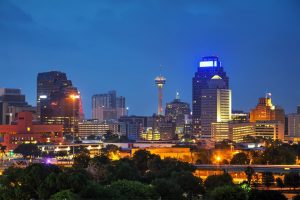Recently, however, San Antonio passed Airbnb regulations for the first time in its history. What are these Airbnb laws and how do they affect San Antonio short term rentals? Read on to find out!
Brief History of Airbnb Regulations for San Antonio Short Term Rentals

Before we dive into the new Airbnb San Antonio laws and how they impact San Antonio short term rentals, let’s review the history regarding Airbnb’s legal status in the Alamo City.
San Antonio, like many cities in the Texas real estate market, is a popular tourist destination. Over 32 million people visit the city annually, and over 20 million of these tourists are overnight visitors. It is then no surprise that Airbnb San Antonio short term rentals have been very profitable.
The city’s Airbnb regulations, or official lack thereof, have also contributed to the success of San Antonio vacation home rentals. According to R Street’s Roomscore 2016 Report, which ranks the Airbnb laws of major US cities, SA is a “silent” city in terms of Airbnb regulations. Up until now, San Antonio had not officially legalized or criminalized Airbnb investing. This is due to the fact that the Texas state legislature mandates individual cities to set up their own Airbnb regulations. The lack of a legal framework did not limit San Antonio short term rentals, however, as the city was still graded a score of 90 in the report.
However, as with most cities without official Airbnb laws, the city began proposing regulations to respond to complaints from residents and to effectively tax Airbnb rentals. After nearly two years of drafting ordinances and planning the process, the San Antonio City Council passed an ordinance on November 1st, with an 8-2 vote that officially regulates and legalizes San Antonio short term rentals.
The New Regulations for Airbnb San Antonio
Here is the link to the passed ordinance. While many issues were addressed in these Airbnb San Antonio laws, we’ll focus on the five main issues.
-
Short Term Rental Types
The ordinance defines San Antonio short term rentals as residences that are rented for less than 30 consecutive days. The law divides vacation home rentals into two types. The first type (Type 1) refers to owner-occupied short term rentals. A non-owner-occupied property is known as a Type 2 property.
-
Permits
Hosts of either type of short term rental, owner-occupied or non-owner-occupied property, must be registered through permits. While the passed laws are effective immediately, investors have up to 90 days to register their short term rentals. The permit application comes with a $100 fee. The permit must be renewed after 3 years, with an additional $100 renewal fee. Other permit application requirements include:
- Proof of insurance
- Proof of registration within the city
- Self-certification regarding property codes and safety provisions, and a 24-hour contact person
- Multi-family properties may receive one Type 2 permit per 8 units
-
Zoning
Type 1 San Antonio short term rentals are allowed anywhere in the city. Type 2 properties, on the other hand, are subject to density limits. These properties are allowed only one unit for short term renting if the property has fewer than 8 units. If the property is more than 8 units and on a residential block, 12.5% of the units can be used as Type 2 units. If the limit is reached, investors can seek an exemption through a $400 appeals process from the City’s Board of Adjustment.
-
Taxes
As it pertains to short term rental taxes, San Antonio Airbnb hosts must pay a 16.75% hotel occupancy tax (HOT). The HOT includes other San Antonio short term rental taxes: a 6% state lodging tax, 9% San Antonio city lodging tax, and a 1.75% Bexar County lodging tax.
-
Other Airbnb Regulations
Miscellaneous San Antonio Airbnb regulations include:
- Advertisements of San Antonio short term rentals are required to include the property’s permit number.
- Short term rentals are prohibited to be used for large events.
- Three or more violations of short term rental laws can lead to a permit revocation and fines of up to $500 per day.
Where to Invest in San Antonio Real Estate for Airbnb Rentals
The newfound SA Airbnb laws will help properly establish San Antonio short term rentals. That, along with the city’s profitability averages shown below, will help foster a lucrative and successful San Antonio real estate market in 2019.
Median Property Price: $291,522
Price Per Square Foot: $131
Airbnb
Rental Income: $2,467
Cap Rate / Cash on Cash Return: 3.48%
Occupancy Rate: 48%
As you can see, the city has high averages for Airbnb rental income, return on investment, and Airbnb occupancy rate. The data was provided by Mashvisor’s investment property calculator. According to the calculator, here are the 4 best neighborhoods to invest in San Antonio real estate for Airbnb rentals.
-
Artesia Community Guild
Median Property Price: $119,900
Price Per Square Foot: $102
Airbnb
Rental Income: $2,854
Cap Rate / Cash on Cash Return: 14.9%
Occupancy Rate: 42%
-
Northwest Los Angeles Heights
Median Property Price: $127,094
Price Per Square Foot: $112
Airbnb
Rental Income: $2,708
Cap Rate / Cash on Cash Return: 11.4%
Occupancy Rate: 42%
-
Springvale
Median Property Price: $122,178
Price Per Square Foot: $106
Airbnb
Rental Income: $2,790
Cap Rate / Cash on Cash Return: 11.01%
Occupancy Rate: 67%
-
Riverside South
Median Property Price: $145,000
Price Per Square Foot: $74
Airbnb
Rental Income: $3,126
Cap Rate / Cash on Cash Return: 10.32%
Occupancy Rate: 47%
Want to start searching for San Antonio short term rentals? Click here to start your 14-day free trial with Mashvisor!